Stories
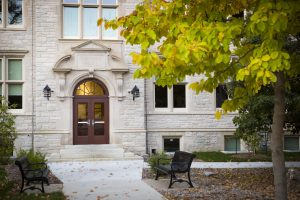
Dec. 21, 2021
Dain Jacobs Receives the American Heart Association Predoctoral Fellowship
Dain Jacob, doctoral student in Nutrition and Exercise Physiology, has received the prestigious American Heart Associate (AHA) Predoctoral Fellowship. The purpose of this fellowship is to enhance the integrated research and clinical training of promising students who are in a predoctoral or clinical health professional degree training program. Jacob is a doctoral student in the Limberg lab.

Dec. 15, 2021
An Untapped Industry
Maple syrup production is most known in the Northeastern United States, but is there a potential maple industry in the lower Midwest? Hannah Hemmelgarn, assistant program director of the Center for Agroforestry, recently received a grant totaling $473,481 for the project, Putting Maple on the Map in the Lower Midwest, to explore just that.

Dec. 15, 2021
Potential for a Warmer Winter
Tony Lupo, a professor of atmospheric science in the University of Missouri College of Agriculture, Food and Natural Resources (CAFNR), said this past fall – the months of September, October and November – was the sixth warmest in Missouri since the state began keeping records in 1889.

Dec. 13, 2021
An Innovative Study Abroad Program
Nix Cannady is working toward their veterinary medicine degree through the FEEPASS Programme at the University of Glasgow.
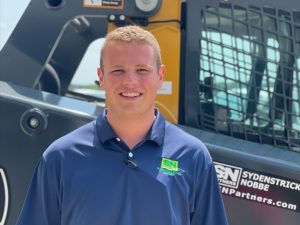
Dec. 13, 2021
Building his own degree
Agriculture program allowed Chase Monte to combine his interest areas into one degree.

Dec. 13, 2021
Senior Spotlight: Emerald McKinley
McKinley will graduate with a degree in biochemistry.
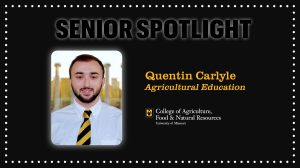
Dec. 13, 2021
Senior Spotlight: Quentin Carlyle
Carlyle will graduate with a degree in agricultural education.

Dec. 13, 2021
Senior Spotlight: Ally Akyol
Akyol will graduate with a degree in parks, recreation and sport.
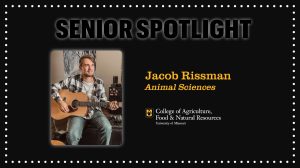
Dec. 13, 2021
Senior Spotlight: Jacob Rissman
Rissman will graduate with a degree in animal sciences.
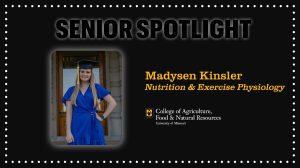
Dec. 13, 2021
Senior Spotlight: Madysen Kinsler
Kinsler will graduate with a degree in nutrition and exercise physiology.